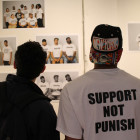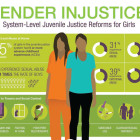
States Look to Raise the Age as Legislative Sessions Wrap Up
|
The number of states that automatically send teenagers younger than 18 to criminal court continues to dwindle as states wrap up their legislative sessions.
Juvenile Justice Information Exchange (https://jjie.org/tag/kids-and-the-law/)

The number of states that automatically send teenagers younger than 18 to criminal court continues to dwindle as states wrap up their legislative sessions.

Think back to yourself at 14 or 15 years old. You’ve just started high school. But you’re not at school now — you’ve been brought downtown for questioning at the police station.

Twenty-two years seems like an awfully short time to already be talking about redemption. But the young man sitting on the velvet couch in the splendor of the Omni Parker House Hotel’s mezzanine is living proof that for someone who has survived the juvenile justice system in America, there is a fine line between ending your life and turning it around.

Adolphus Graves, the chief probation officer of Fulton County Juvenile Court in Atlanta, was driven to transform his juvenile justice system by the mistakes he made as a young probation officer.
“I was a little wayward and misguided as a probation officer,” he said. “Knowing my times as a probation officer, and how many things I did horribly, or how many children that I irresponsibly, or sometimes just ignorantly, subjected to detention because I had no other tools. ... The recurring theme consistently has been the lack of knowledge, of understanding what’s going on, the depth of what’s going on in a child’s life.”

“We want to know what does a world look like where 10-year-olds aren’t being arrested,” said the woman who trained Bronx young people to survey their peers and write a report about how juveniles are treated when they're arrested.

Our probation officers are often underequipped to prevent youth from becoming funneled deeper into the system, especially youth with untreated or undiagnosed mental health needs.

Research over the past several decades has established that youth exposure to violence is a widespread and significant problem. This is particularly true for youth involved in the juvenile justice system, as research has shown that up to 90 percent of these youth have histories of violence exposure, with many reporting multiple serious incidents.

A federal investigation will examine whether discriminatory school disciplinary policies are disproportionately affecting black students in DeSoto County, Mississippi.

One of the starkest statistics in the lives of girls today is that 73 percent of girls in the juvenile justice system have been physically or sexually abused, according to U.S. Bureau of Justice figures.

They’re labeled thugs, treated like throwaways and classified by some as “superpredators”: teenage boys and girls who seek sanctuary in gangs, commit violent crimes and end up in the criminal justice system. Not only are they physically locked up, but these children are caged in emotional turmoil.